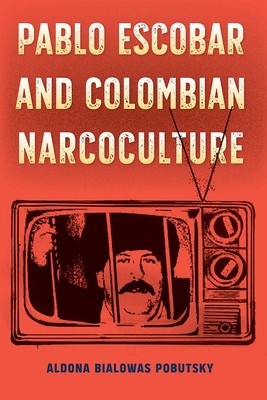
- Išsiųsime per 10–14 d.d.
- Autorius: Aldona Bialowas Pobutsky
- Leidėjas: University of Florida Press
- ISBN-10: 1683404866
- ISBN-13: 9781683404866
- Formatas: 15.2 x 22.9 x 1.8 cm, minkšti viršeliai
- Kalba: Anglų
- Extra -15 % nuolaida šiai knygai su kodu: ENG15
Pablo Escobar and Colombian Narcoculture (el. knyga) (skaityta knyga) | knygos.lt
Atsiliepimai
Aprašymas
How the legacy of Pablo Escobar inspired the development of narcoculture in Colombia and around the world
In
the years since his death in 1993, Colombian drug lord Pablo Escobar
has become a globally recognized symbol of crime, wealth, power, and
masculinity. In this long-overdue exploration of Escobar's impact on
popular culture, Aldona Bialowas Pobutsky shows how his legacy inspired
the development of narcoculture--television, music, literature, and fashion representing the drug-trafficking lifestyle--in Colombia and around the world.
Pobutsky
looks at the ways the "Escobar brand" surfaces in bars, restaurants,
and clothing lines; in Colombia's tourist industry; and in telenovelas,
documentaries, and narco memoirs about his life, which in turn have
generated popular interest in other drug traffickers such as Griselda
Blanco and Miami's "cocaine cowboys." Pobutsky illustrates how the
Colombian state strives to erase his memory while Escobar's notoriety
only continues to increase in popular culture through the transnational
media. She argues that the image of Escobar is inextricably linked to
Colombia's internal tensions in the areas of cocaine politics, gender
relations, class divisions, and political corruption and that his
"brand" perpetuates the country's reputation as a center of organized
crime, to the dismay of the Colombian people. This book is a fascinating
study of how the world perceives Colombia and how Colombia's citizens
understand their nation's past and present.
A
volume in the series Reframing Media, Technology, and Culture in
Latin/o America, edited by Héctor Fernández L'Hoeste and Juan Carlos
RodrÃÂguez
EXTRA 15 % nuolaida su kodu: ENG15
Akcija baigiasi už 5d.01:44:59
Nuolaidos kodas galioja perkant nuo 10 €. Nuolaidos nesumuojamos.

- Autorius: Aldona Bialowas Pobutsky
- Leidėjas: University of Florida Press
- ISBN-10: 1683404866
- ISBN-13: 9781683404866
- Formatas: 15.2 x 22.9 x 1.8 cm, minkšti viršeliai
- Kalba: Anglų Anglų
How the legacy of Pablo Escobar inspired the development of narcoculture in Colombia and around the world
In
the years since his death in 1993, Colombian drug lord Pablo Escobar
has become a globally recognized symbol of crime, wealth, power, and
masculinity. In this long-overdue exploration of Escobar's impact on
popular culture, Aldona Bialowas Pobutsky shows how his legacy inspired
the development of narcoculture--television, music, literature, and fashion representing the drug-trafficking lifestyle--in Colombia and around the world.
Pobutsky
looks at the ways the "Escobar brand" surfaces in bars, restaurants,
and clothing lines; in Colombia's tourist industry; and in telenovelas,
documentaries, and narco memoirs about his life, which in turn have
generated popular interest in other drug traffickers such as Griselda
Blanco and Miami's "cocaine cowboys." Pobutsky illustrates how the
Colombian state strives to erase his memory while Escobar's notoriety
only continues to increase in popular culture through the transnational
media. She argues that the image of Escobar is inextricably linked to
Colombia's internal tensions in the areas of cocaine politics, gender
relations, class divisions, and political corruption and that his
"brand" perpetuates the country's reputation as a center of organized
crime, to the dismay of the Colombian people. This book is a fascinating
study of how the world perceives Colombia and how Colombia's citizens
understand their nation's past and present.
A
volume in the series Reframing Media, Technology, and Culture in
Latin/o America, edited by Héctor Fernández L'Hoeste and Juan Carlos
RodrÃÂguez




Atsiliepimai